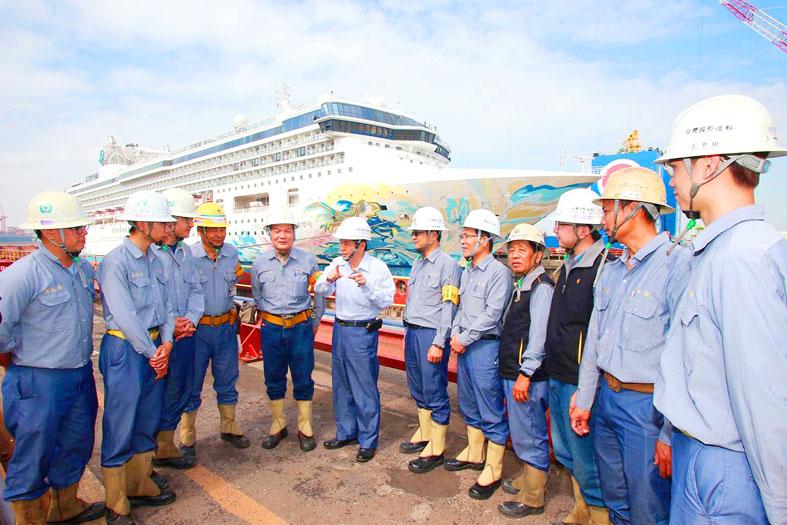CSBC Corp, Taiwan (台船) yesterday reported a pretax profit of NT$34 million (US$1.2 million) for last quarter, ending five consecutive quarters of losses.
The turnaround could be attributed to cost improvements and lower foreign exchange volatility, a CSBC official told the Taipei Times by telephone.
Although the shipbuilder’s revenue fell 17.65 percent annually to NT$4.52 billion in the first quarter, its costs dropped at an even faster rate, thanks to production improvements at its two plants in Keelung and Kaohsiung.

Photo courtesy of CSBC Corp, Taiwan
As a result, its gross margin returned to positive territory last quarter, the official said.
Last year, it reported a gross margin of minus-5.57 percent as its cost of goods sold exceeded total sales, company data showed.
Aside from cost reductions, the appreciation of the New Taiwan dollar against the US dollar moderated in the first quarter compared with a year earlier, resulting in lower foreign-exchange losses, CSBC said.
As most orders CSBC obtained from shippers, such as Yang Ming Marine Transport Corp (陽明海運), to build commercial vessels are denominated in the greenback, the local currency’s appreciation affects its revenue significantly, the official said.
Last quarter, CSBC delivered a new vessel with capacity of 2,800 twenty-foot equivalent units to Yang Ming, and plans to deliver another two vessels by the end of this year, the official said.
“The revenue generated from the US dollar-denominated vessels orders would account for a smaller share of our total sales by the end of this year, as we are shifting our focus to military vessels for the Ministry of National Defense and marine constructions for offshore wind farms,” the official said.
As a result, foreign-exchange rate volatility is expected to have a weaker impact on CSBC’s sales going forward, the official said.
Revenue from orders from the ministry accounted for 60 percent of the company’s total sales in the first quarter, while those from the commercial vessels and marine constructions accounted for the remaining 40 percent, CSBC said.

GROWING CONCERN: Some senior Trump administration officials opposed the UAE expansion over fears that another TSMC project could jeopardize its US investment Taiwan Semiconductor Manufacturing Co (TSMC, 台積電) is evaluating building an advanced production facility in the United Arab Emirates (UAE) and has discussed the possibility with officials in US President Donald Trump’s administration, people familiar with the matter said, in a potentially major bet on the Middle East that would only come to fruition with Washington’s approval. The company has had multiple meetings in the past few months with US Special Envoy to the Middle East Steve Witkoff and officials from MGX, an influential investment vehicle overseen by the UAE president’s brother, the people said. The conversations are a continuation of talks that

With an approval rating of just two percent, Peruvian President Dina Boluarte might be the world’s most unpopular leader, according to pollsters. Protests greeted her rise to power 29 months ago, and have marked her entire term — joined by assorted scandals, investigations, controversies and a surge in gang violence. The 63-year-old is the target of a dozen probes, including for her alleged failure to declare gifts of luxury jewels and watches, a scandal inevitably dubbed “Rolexgate.” She is also under the microscope for a two-week undeclared absence for nose surgery — which she insists was medical, not cosmetic — and is

Nintendo Co hopes to match the runaway success of the Switch when its leveled-up new console hits shelves on Thursday, with strong early sales expected despite the gadget’s high price. Featuring a bigger screen and more processing power, the Switch 2 is an upgrade to its predecessor, which has sold 152 million units since launching in 2017 — making it the third-best-selling video game console of all time. However, despite buzz among fans and robust demand for pre-orders, headwinds for Nintendo include uncertainty over US trade tariffs and whether enough people are willing to shell out. The Switch 2 “is priced relatively high”

Alchip Technologies Ltd (世芯), an application-specific integrated circuit (ASIC) designer specializing in artificial-intelligence (AI) chips, yesterday said that small-volume production of 3-nanometer (nm) chips for a key customer is on track to start by the end of this year, dismissing speculation about delays in producing advanced chips. As Alchip is transitioning from 7-nanometer and 5-nanometer process technology to 3 nanometers, investors and shareholders have been closely monitoring whether the company is navigating through such transition smoothly. “We are proceeding well in [building] this generation [of chips]. It appears to me that no revision will be required. We have achieved success in designing